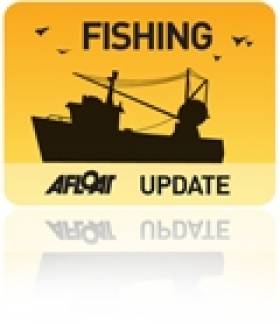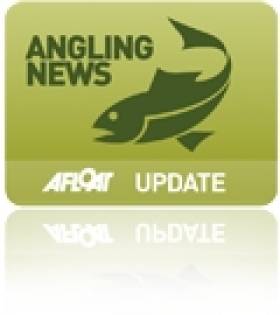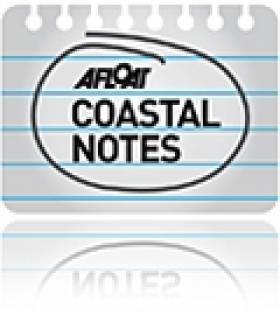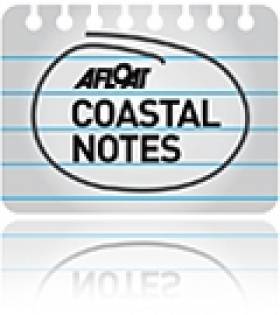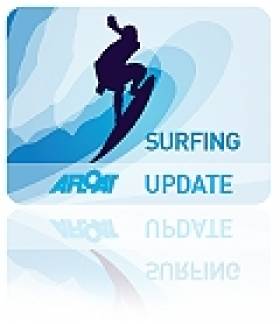Displaying items by tag: environmental impact statement
#Fishing - The Irish Times reports that Inland Fisheries Ireland (IFI) has expressed "serious concerns" over the findings of a new study on wild salmon in Ireland.
The State agency for Ireland's fisheries argues that the study - which concluded not only that pollution has a greater impact on wild salmon numbers than fish farming, but also that salmon catchments in close proximity to aquaculture schemes were some of the best performing - is based on flawed methodology.
IFI is among the chorus of voices opposed to the planned organic salmon farm off the Aran Islands in Galway Bay - a 500-hectare project by Bord Iascaigh Mhara (BIM) that would be the largest of its kind in Europe if given the go-ahead.
Marine Minister Simon Coveney recently attempted to alleviate concerns over the controversial scheme, claiming there would be no damage to the environment or fish stocks.
However, the controversy doesn't end there, as last month celebrity chef and 'Slow Food' champion Darina Allen wrote to the minister over erroneous claims in BIM's environmental impact statement (EIS) for the project.
As reported by the Galway Independent, Allen contacted Minister Coveney to clarify that the Slow Food movement does not support fish farming projects, after references to the initiative in the EIS "seemed to create a lot of confusion".
Allen told the paper: “Many people contacted me under the perception that Slow Food endorsed the whole salmon farm thing and actually Slow Food has made no statement whatsoever on it.”
Later, Michèle Mesmain of Slow Food International confirmed that “salmon farming does not fit in any pillar of Slow Food”.
The Galway Independent has much more on the story HERE.
IFI Repeats Concerns Over Aran Islands Fish Farm
#Angling - Anglers on the River Feale in Kerry and Limerick have been assured by Inland Fisheries Ireland (IFI) that it supports their concerns over the proposed deep-sea fish farm in Galway Bay, as the Limerick Leader reports.
Local anglers are among those throughout the region who have rallied in opposition to plans for the Aran Islands fish farm project, over fears that it would lead to “an explosion” in parasitic sea lice which would prey on wild inland salmon from Irish rivers feeding in the North Atlantic.
IFI reiterated its statement issued last month in which its board said it does not believe "that the corpus of peer reviewed international scientific literature which recognises the negative impacts of sea lice on salmonids have been adequately dealt with" in the Environmental Impact Statement prepared by Bord Iascaigh Mhara (BIM) as part of the public consultation process.
A spokesperson for IFI told the Limerick Leader that the authority has "major concerns about the location and scale [of the farm], as well as its potential impact on sea life. [IFI] is not supporting it in its current form.”
Earlier this month the National Inland Fisheries Forum also criticised as "flawed" the consent process regarding the 15,000-tonne organic salmon farm planned off Inis Oirr, which would be the largest of its kind in Europe.
If approved, the operation could more than double Ireland's current production rate of farmed salmon.
The Limerick Leader has much more on the story HERE.
Dalkey Prospect Foreshore Licence Disputed
#DALKEY OIL LICENCE – An Taisce has alleged the Government acted unlawfully in how it granted Providence Resources a foreshore licence at the Dalkey Island prospect in Dublin Bay, reports The Irish Times.
In High Court proceedings, An Taisce claims the Government wrongly concluded an environmental impact assessment (EIA) was not required to be carried out prior to awarding the licence to Irish-listed oil and gas exploration company.
An Taisce claims that under the relevant EU directive an EIA is required and the decision of September 27th last granting the licence should be quashed. It is also seeking a declaration the Government has failed to properly transpose or implement environmental impact assessment Directive 2011 92 EU into Irish law.
The licence is for an area in the Kish Bank basin and allows Providence carry out a number of activities, including a seismic study, well site survey and the drilling of an exploration well. The edge of the licence area is about 10km from Dalkey Island.
Mr Justice Michael Peart yesterday granted the ex parte application (one side only represented) for leave to bring the judicial review proceedings and returned the matter to February.
As reported earlier this month on Afloat.ie, the Minister for Heritage Jimmy Deenihan announced proposals for six Special Areas of Conservation (SACs) sites to include an area designated between Rockabill to Dalkey Island.
Meeting for Bantry Bay Fish Farm Opponents Tonight
#COASTAL NOTES - Bantry Bay has reached its capacity for salmon farming, says the committee formed to oppose a proposed new facility at Shot Head.
Save Bantry Bay has called a public meeting for supporters tonight (24 March) at Eccles Hotel in Glengarrif, Co Cork, starting at 8.15pm - where chairman Kieran O'Shea will give a presentation on the group's "wide-ranging objections", as The Fish Site reports.
Minister for the Marine Simon Coveney is currently considering the licence application for Marine Harvet's proposed salmon farm at Shot Head in Adrigole.
Concerns among the committee's members include the potential spoiling of the area's natural beauty having a knock-on effect on tourism, and the environmental consequences of algae blooms from nitrogen and phosphorous waste.
Local fisherman fear that a fish farm of more than 100 acres would see the closing off of part of an "important ground for shrimp and prawn".
Possible infection of wild salmon in local river systems by sea lice from farmed salmon is also an issue, with the Environmental Impact Statement for Shot Head highlighting an outbreak of lice at Marine Harvest's facility in Roancarrig two years ago.
The Fish Site has more on the story HERE.
- Coastal Notes
- Fishing
- Bantry Bay
- Co Cork
- fish farm
- salmon farm
- Shot Head
- Adrigole
- Glengarrif
- Eccles Hotel
- Save Bantry Bay
- Minister for the Marine
- Simon Coveney
- Marine Harvest
- tourism
- environment
- algae blooms
- nitrogen
- phosphorous
- waste
- shrimp
- prawn
- infection
- Wild Salmon
- sea lice
- environmental impact statement
- Roancarrigh
Surfers Welcome New Ruling on Doolin Pier Development
Surfers have hailed the recent ruling by An Bord Pleanála that Clare County Council must reapply for planning permission for its proposed €6 million redevelopment of Doolin Pier.
As previously reported on Afloat.ie, local surfers and the Irish Surfing Association (ISA) had expressed dismay over the current development plans – approved by the council earlier this year – which they maintain would result in the destruction of the "world renowned" waves at Doolin Point and Crab Island.
The Irish Times reports that the council must now resubmit its planning application and prepare and environmental impact statement (EIS) due to the potential impact on tidal and wave patterns in the area, setting back plans for at least a year.
The proposed scheme already has support from the local business community and the Doolin Coast Guard unit, which argues that congestion on the pier in peak tourist periods may interfere with rescue efforts.
A spokesperson for the West Coast Surf Club said that both it and the ISA were available "to meet with the council to progress a mutually agreeable design for the pier".
The Irish Times has more on the story HERE.



























